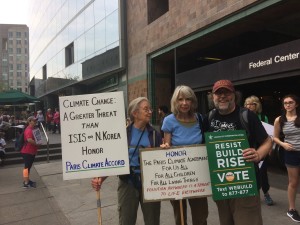By Mike Weilbacher, Executive Director
Today I’m writing as a neighbor and friend, and I’m writing about something personal. On Saturday, under a brutal April sun, itself both oxymoron and bad omen, my wife and I joined more than 200,000 people in Washington, D.C. for the People’s Climate March. It was an extraordinary event, witnessing a rainbow coalition of people from every corner of the country and in every walk of life coming together for action on climate change.
We walked alongside a nurses union from New York, behind the International Brotherhood of Electrical Workers, themselves just behind the Service Employees International Union. Grandparents marched alongside their grandchildren. A Jewish group paraded just ahead of a Catholic organization carrying banners of Pope Francis quotes, the Quakers right behind them. “The seas are rising, and so are we,” said the Unitarian banner.
Green Latinos carried a huge banner not far from a giant street-wide quilted banner hoisted by Lancaster Against Pipelines. Utahans Against Climate Change marched. An Environmental Justice banner carried by a beautifully integrated cross-section of people walked with Native Americans from across the country, including Standing Rock, themselves alongside Flint residents terrified by their drinking water situation.
The march looked like America, as it should, regular people worried about an increasingly irregular future.
So here’s why I marched. The science of climate change is real, settled, and scary: carbon dioxide concentrations are higher now than ever in human history; ice caps are melting at higher rates than the fiercest models predict; sea levels are rising even as I write, the Delaware River alongside the ocean. 2016 was the planet’s hottest year ever, beating only 2015’s record. Philadelphia is hotter now than ever. In early April, a named tropical depression, Arlene, arose in the Caribbean, setting a record for the earliest, most northerly named storm in history.
I’m the father of two girls in their 20s, the older a few years out of college and working now, the younger graduating this month. As someone who has been educating about the environment in general and climate change in specific for almost 40 years now, I feel like I have personally let them down. That the future they face is a scary one of hotter climates, more frequent severe weather events, possible droughts followed by floods, food insecurity, climate refugees from low lying areas flooding other countries. Philadelphia is lucky to be so far form the ocean; the Jersey shore, not so much. If I were a New Yorker surrounded by water, I would be terrified. And goodbye Miami.
I’d love to be a grandparent one day, but I worry what their children will have to contend with as adults.
And I am reeling from the radical loss of species we are witnessing now and will continue witnessing. Large charismatic animals like polar bears, now the poster child for climate change, and rhinos, large cats, gorillas, and orangutans are definitely in trouble, but far more worrisome is the loss of thousands of species of small organisms, the ones that hold up the planet. Populations of frogs and toads worldwide, for example, are already in freefall.
And I marched because it’s 2017, and half of this country still doesn’t yet believe what the other half is convinced of—that the climate is not just changing, but has in fact already changed, and will only change more.
We have a very small window of opportunity to pull ourselves back from the brink. And ironically, even sadly, many of the solutions to climate change will actually restart the economy and contribute hugely to restoring the middle class. 21st century manufacturing jobs will not be in coal or even oil, but rather in the clean energy economy—and it saddens me that we are already ceding this territory to China. We could own this sector of the global economy if we wished, but instead we get bogged down in near-sighted infighting.
Back in the 1960s, Martin Luther King, talking about a very different issue, noted the “fierce urgency of now.” For me, having been teaching about the environment since the 1970s, I feel that fierce urgency of now. So I marched.
And I invite you to consider all the things you might do to contribute to cooling the climate, and ask one simple favor: please learn about this issue, and as you learn, join those 200,000 people in D.C. last weekend in asking our nation’s leadership to respond to the signature environmental issue of our time.
Last Saturday, I awoke at 4:15 a.m. to catch an early bus to the march, and just as we got up, a violent storm passed over the region—big lightning, loud thunder, totally typical for August when the atmosphere is burdened by too much heat, but completely atypical for April. Yet another sign that the climate is broken.
And someone needs to fix it. I’m on board. You?






